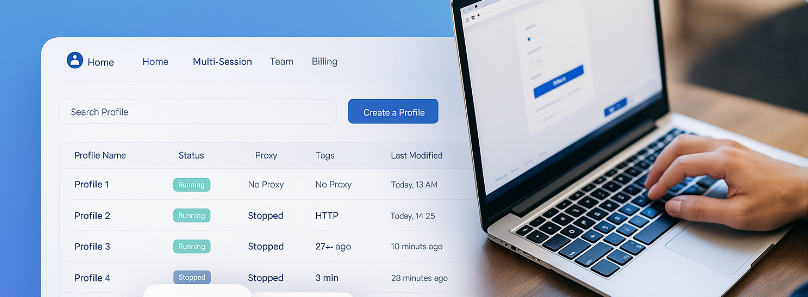
- Product

- Pricing
- Affiliate Program
- Use Cases
- Resource


Running offers in traffic arbitrage is a full-cycle operation: analyzing verticals, preparing accounts, testing hypotheses, and scaling winning funnels. At every stage, the media buying team faces new risks and challenges. This article explores strategies for selecting offers, protecting ad accounts using anti-detect tools, and the methods we use to maintain stability and scale campaigns effectively.
Major companies that prioritize scaling through paid traffic always account for ban risks and seek to minimize them. One of the most important objectives is to preserve the "health" of advertising accounts and ensure uninterrupted campaign performance. That’s where MoreLogin, a powerful anti-detect browser, becomes an indispensable daily tool. But let’s take it step by step.
Platforms like Facebook, TikTok, and Google actively develop systems to detect suspicious accounts by monitoring:
User behavior: Normal activity includes exploring the platform, following pages, and posting comments. Immediate ad launches after registration appear suspicious.
Device and browser history: Platforms analyze cache, cookies, and fingerprinting parameters (WebGL, Canvas, AudioContext, fonts). Even minor similarities can trigger bans.
IP addresses: Frequent IP changes, suspicious proxies, or repeated logins from the same IP range raise red flags.
Clearing cookies or using basic VPNs no longer works. You need to fully mask your device’s digital fingerprint — that’s why anti-detect browsers have become a core component of any arbitrage team’s toolkit.
Without professional tools, media buyers face:
Instant detection of account links
Mass bans of advertising accounts
Loss of time and money spent warming up and preparing profiles
Algorithms analyze even the tiniest details — identical Canvas fingerprints, repeated browser plugins, matching media devices. Even slight overlaps significantly raise the risk of detection.
Solution: Use anti-detect browsers to create unique digital identities for each account.
Proxies are another fundamental element in account protection. There are four main types:
IPv4 proxies: Still functional but becoming outdated
IPv6 proxies: Modern, though not all websites support them
Residential proxies: IPs from real users — hard to detect
Mobile proxies: Best for Facebook* and TikTok — dynamic IPs simulate real user behavior
We primarily use mobile and residential proxies in combination with MoreLogin, assigning unique proxies to each browser profile.
Creating an account isn’t enough — it needs to be “brought to life.” Our farming process includes:
Gradual actions: likes, follows, video views
Delayed addition of payment info
Varying behavioral patterns
Using different IPs and devices at different stages
We track account behavior with specialized trackers that log the entire “life history” of each profile.
As advertising platforms’ moderation algorithms become more advanced, protecting ad accounts is critical. Bans, account blocks, and limited reach can wipe out months of effort and severely affect financial performance. MoreLogin, an anti-detect browser, has proven to be one of the most effective solutions.
Before addressing solutions, it’s important to understand the causes:
Behavioral anomalies: New accounts that immediately launch aggressive ad campaigns
Technical fingerprinting: Platforms detect patterns in device specs — WebGL, Canvas, audio, fonts, IP, etc.
Cross-account connections: Shared devices, IPs, or browser fingerprints often lead to bans across all linked profiles
Unusual activity: IP location changes, suspicious payment additions, identical actions across profiles
Even high-quality accounts with good proxies can’t survive without proper fingerprint masking.
Many teams experience mass bans in Facebook Ads while scaling in the U.S. and Canada. Standard proxies and account farming weren’t enough. After integrating MoreLogin and assigning unique fingerprints to each funnel, we achieved the following:
Increased average account lifespan from 5 days to 40 days
Reduced lead cost by 18%
Decreased bans by 65%
Proper anti-detect configuration helped the team increase project ROI by 28% in just 3 weeks.
Emulates different browsers, OSs, and devices
Controls WebGL, Canvas, audio devices, and fonts
Generates separate local storage and cookies per profile
Works with all proxy types (mobile, residential, IPv4, IPv6)
Supports team collaboration — profiles can be shared without ban risk
Every account “lives” in its own secure environment, reducing the chance of linkage or detection.
Platforms trust “natural” user behavior. As a result:
CPM drops by 15–25%
CPC decreases by 10–20%
ROI increases by 20–35%
With stable accounts, media buyers can scale successful funnels faster and spend fewer resources on recovery after bans.
In modern traffic arbitrage, anti-detect browsers are not optional — they’re essential. Without them, scaling becomes nearly impossible, and the risks multiply. Today’s successful teams build workflows where every member not only uses tools like MoreLogin, but understands how they help bypass detection and drive results.